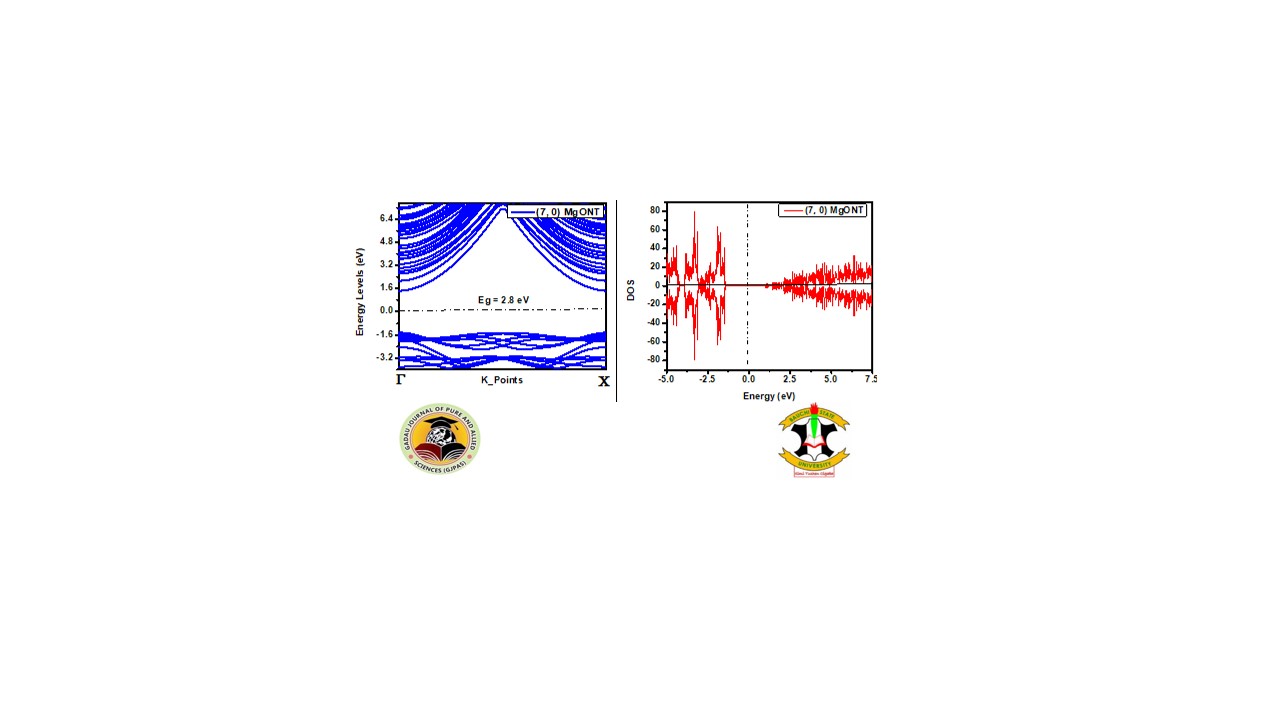Ab’initio studies of the structural and electronic properties for single-walled armchair MgONT, SiCNTs and ZnONTs for next generations’ optoelectronics
Ab’initio studies of the structural and electronic properties for single-walled armchair magnesium oxide nanotubes, silicon carbide nanotubes and zinc oxide nanotubes for next generations’ optoelectronics
DOI:
https://doi.org/10.54117/gjpas.v1i2.42Keywords:
Magnesium oxide nanotubes, DFT ab initio, zinc oxide nanotubes, sustainability science, silicon carbide nanotubesAbstract
Due to greater demand to use 1D semiconducting chips to replace semiconductors made from bulk structures We studied the structural and electronic properties of free (7, 0) metallic oxides and non-metallic carbide nanotubes. SWMgONT, SWZnONT and SWSiCNT were chosen as the representative model. All the quantum simulation studies were done within DFT ab’initio implemented in quantum ESPRESSO. Results obtained for structural properties revealed that the most stable bond lengths of MgONT, ZnONT and SiCNT are 1.80 Å, 1.82 Å and 1.42 Å respectively. The results obtained revealed 2.8 eV band gap for SWMgONT, 0.5 eV for SWZnONT and 0.8 eV for SWSiCNT respectively. Furthermore SWMgONT and SWZnONT are regarded as direct band gap semiconductors while SWSiCNT is regarded as an indirect semiconductor with narrow band gap. The narrow band gap of all the three systems obtained demonstrates their potential in the optoelectronic application in the next generations’ sustainability science and technology. Recent studies showed that explorations were conducted on oxide nanotubes such SiO2NT, however to the best of our knowledge, studies of the oxide nanotubes of Mg, Zn and Si have not been reported, hence few literature are available.
References
Badar, N., Fadilah, N., Rusdi, R., and Kamarudin, N. (2012). Band Gap Energies of Magnesium Oxide Nanomaterials Synthesized by the Sol-Gel Method. Advanced Materials Research, 545. doi:10.4028/www.scientific.net/AMR.545.157
Chang, Q. (2007). Determination of the chiral indices (n,m) of carbon nanotubes by electron diffraction. Physical Chemistry Chemical Physics, 9, 31-48. doi:10.1039/b614121h
Chien, H.C., Chi, Y.C., Kuo, C.C., Tsung, W.H., Ming, H, and Ning, C. (2021). Quantum computation: Algorithms and Applications. Chinese Journal of Physics, 72, 248-269. doi:https://doi.org/10.1016/j.cjph.2021.05.001
Hieu, P.T., Shamsul, A., Piao, J., and tran, V.C. (2016). Nanostructured Optoelectronics: Materials and Devices. Journal of Nanomaterials(special issue). doi:https://doi.org/10.1155/2016/2051908
Honghong, W., Zhong, C., Jinzhu, M., Qingxin, M., and hong, H. (2020). The adsorption and oxidation of SO2 on MgO surface: experimental and DFT calculation studies†. Environmental Science: Nano(4). doi: https://doi.org/10.1039/C9EN01474H
Itas, Y.S., Abdussalam, B.S., Aminu, Chifu, E.N., and Tasiu, Z. (2020). Carbon Nanotubes: A Review of Synthesis and Characterization Methods/Techniques. International Journa of Science and Tecknowledge, 10(2), 43-50. doi:10.24940/theijst/2020/v8/i2/ST2002-020
Itas, Y.S and Mayeen, M.K. (2022). Cancerous and Non-Cancerous Brain MRI Classification Method Based on Convolutional Neural Network and Log-Polar Transformation. Healthcare, 10(9), 801. doi:https://doi.org/10.3390/healthcare10091801
Itas, Y.S., Abdussalam, B.S., Chifu, E.N., Lawal, A. Razif, R. and Mayeen, M.K (2022). Computational Studies of the Excitonic and Optical Properties of Armchair SWCNT and SWBNNT for Optoelectronics Applications. Crystals, 12(6). doi:https://doi.org/10.3390/cryst12060870
Itas, Y.S., Abdussalam, B.S., Chifu, E.N., Lawal, A. Razif, R., Pavaiz, A., and Mayeen, M.K (2022). The Exchange-Correlation Effects on the Electronic Bands of Hybrid Armchair Single-Walled Carbon Boron Nitride Nanostructure. Crystals, 12(2). doi:https://doi.org/10.3390/cryst12030394
Larina, E.V., Chmyrev, V.I., Skorikov, V.M., and Makaev D.V. (2008). Band structure of silicon carbide nanotubes. Inorganic Materials, 44(8), 823-834. doi:10.1134/S0020168508080086
Maigari. (2022). Density Functional Theory Study of the Structural, Electronic, Non-Linear Optical and Thermodynamic Properties of Poly (3-Hexylthiophene-2, 5-Diyl) in Gas Phase and in Some Solvents. Physical Science International Journal, 2, 34-51.
Meenakshi, C., Sudheesh, K.S., Vinod, K., and Bindu, M. (2021). 1D Nanomaterials and Their Optoelectronic Applications. Nanomaterials for Optoelectronic Applications, 12. doi:10.1201/9781003083948-3
Muruga, R., Ramamoorthy, K., Sundarrajan, S., and Ramakrishna, S. (2012). Magnesium oxide nanotubes: synthesis, characterization and application as efficient recyclable catalyst for pyrazolyl 1,4-dihydropyridine derivatives. Tetrahedron, 68(35), 7196-7201. doi:https://doi.org/10.1016/j.tet.2012.06.017
Ogihara, H., Sakae, T., Ichiro, Y., Tanabe, E., Akira, G. and Kiyoshi, O. (2016). Synthesis of SiO2 Nanotubes and Their Application as Nanoscale Reactors. Chem. Mater, 4, 996–1000. doi:https://doi.org/10.1021/cm051727v
Sushant, S., Bhanu, P.S., Sampat, S.C., Jeevan, J., and Tomohiro, Y. (2018). Enhanced thermomechanical and electrical properties of multiwalled carbon nanotube paper reinforced epoxy laminar composites. Composites Part A: Applied Science and Manufacturing, 104, 129-138. doi:https://doi.org/10.1016/j.compositesa.2017.10.023
Vyom, P., Corentin, P.D., Boyi, H., Rodrigo, G.A., Ravindra, P., and Yoke, K.Y. (2015). Switching Behaviors of Graphene-Boron Nitride Nanotube Heterojunctions. Scientific reports, 5(12238). doi:https://doi.org/10.1038/srep12238
Yuqing, Z., Weijin, Q., Weijun, H., Boyang, L., Hao, L., and Changkun,D. (2019). Carbon Nanotube-Graphene Hybrid Electrodes with Enhanced Thermo-Electrochemical Cell Properties. Nanomaterials (Basel), 9(10). doi:10.3390/nano9101450.

Downloads
Published
Issue
Section
License
Copyright (c) 2022 Gadau Journal of Pure and Allied Sciences

This work is licensed under a Creative Commons Attribution 4.0 International License.

